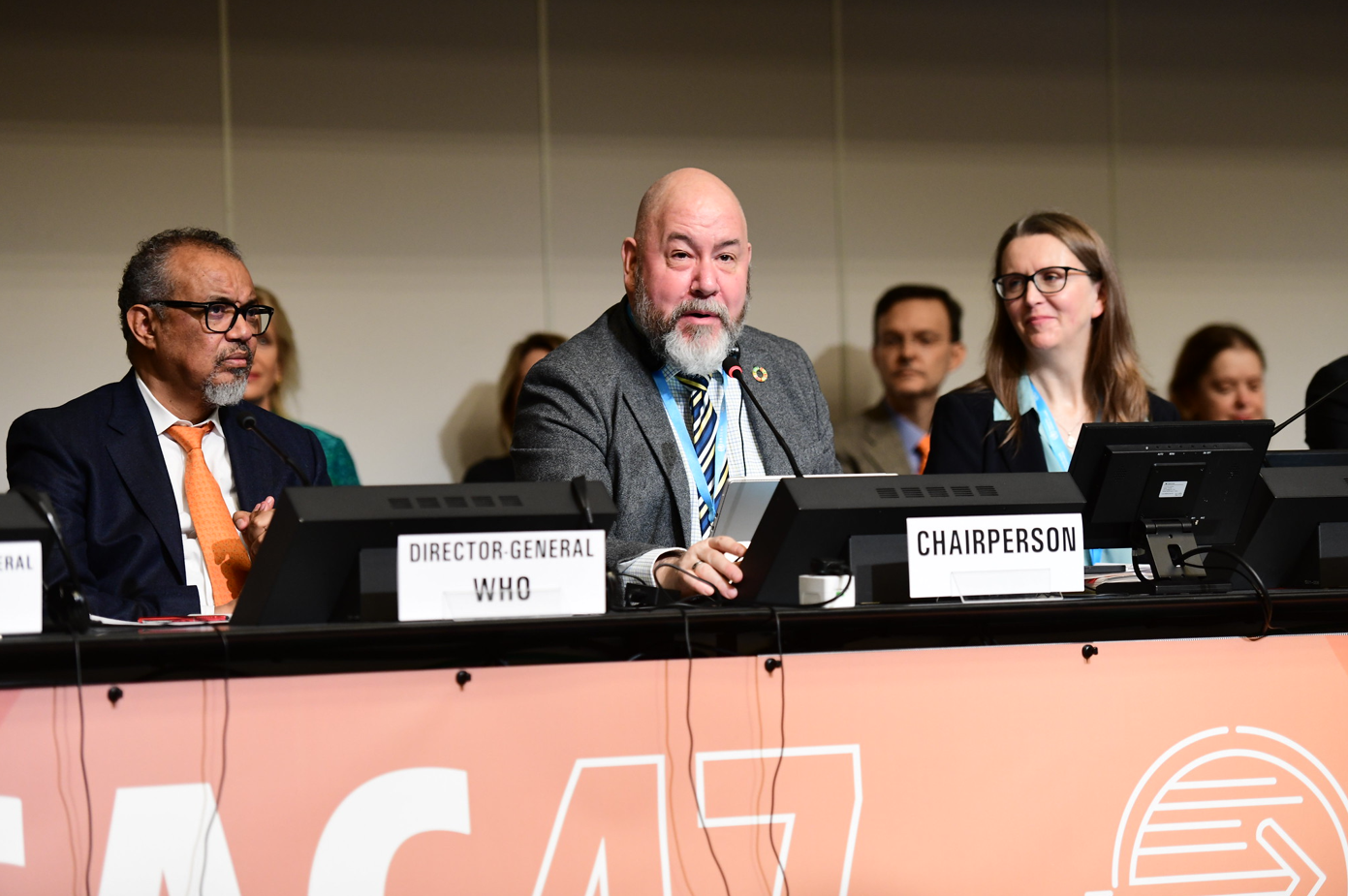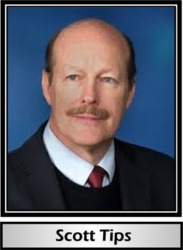Editor’s Note: This article is intended for information purposes only. Because state and municipal laws vary greatly, as do the circumstances of individual cases, readers are advised to contact an attorney for specific legal advice. ©Scott. C. Tips 2025. The views and opinions expressed here are those of the author(s) and contributor(s) and do not necessarily reflect those of the publisher and editors of WholeFoods Magazine.
Under overcast skies but with Winter’s icy grip not yet present, the 47th session of the Codex Alimentarius Commission (CAC) met for six days from November 25-30, 2024, in Geneva, Switzerland at the CICG hall. CAC Chairman Steve Wearne presided over his last meeting as he was unfortunately termed out after three years and could not remain Chairman any longer despite the wishes of most delegations there.
The meeting began on Monday, November 25th, with several speeches, the first of which was by WHO Director-General Tedros Ghebreyesus, who spent the first part of his speech beating the tired old drum of “climate change.” After the speech-making, the rest of the meeting followed its familiar pattern of being well-run and on schedule as Mr. Wearne methodically took the assembled delegates through one agenda item after another. Numerous food standards were considered and either adopted or else advanced up the eight-step process towards final adoption.
The National Health Federation (NHF)—in attendance at these Commission meetings for over two decades as a Codex-accredited INGO—was primarily interested in the food standards being discussed for aspartame, pesticide residues, and the new work proposed by India to set global standards for dietary supplements (1). Of those three, the aspartame food standard setting an Acceptable Daily Intake (ADI) for the sweetener came up for discussion first.
Aspartame Food Standard
Let’s be clear. To most of the Codex delegates, the Joint FAO/WHO Expert Committee on Food Additives (JECFA) is a science God, and they continually genuflect at its altar. Any heretic who dares to question JECFA science risks excommunication, or at least public humiliation. At a minimum, with group-think rampant at these meetings, anyone challenging JECFA science has got to be mad. So, being mad, I challenged the JECFA risk assessments on aspartame, both of which state that consuming aspartame up to the level of 40 mg/kg of body weight is perfectly safe (2).
NHF submitted a Conference Room Document (CRD 47) on aspartame and also, when the time came, asked for the floor to emphasize its opposition to aspartame as a toxic food additive (3). NHF also challenged the objectivity of the JECFA risk assessment panel, given that 6 of its 13 members had connections with a food industry front group founded by a Coca-Cola executive.
When recognized by the Chairman, NHF essentially said the following to the assembled delegates:
“The NHF would like to express its concerns with setting the ADI for aspartame (INS 951) at 40 mg/kg of body weight for three main reasons: (1) Aspartame contains methanol, a dangerous toxicant, which was not adequately considered in the JECFA review; (2) Aspartame is an unjustified food additive since it violates Codex’s Preamble (REP13/FA) that “the use of food additives is justified only when such use has an advantage, does not present an appreciable health risk to consumers, does not mislead the consumer, and serves one or more technological functions”; and (3) Questions have arisen about the rampant conflicts of interest in the JECFA assessment panel on Aspartame because at least 6 out of the 13 JECFA panel members have ties to the industry trade group called International Life Sciences Institute (ILSI), which was founded by a Coca-Cola executive and is heavily funded by the same soft drink industry and pharmaceutical companies (4). Given these major issues with the Aspartame ADI, NHF asks the Commission to reject the 40 mg/kg ADI. Our CRD 47 sets forth our reasons in more detail. Please read that document. Thank you, Mr. Chairman.”
 CAC Chairman Steve Wearne, center (c) FAO
CAC Chairman Steve Wearne, center (c) FAOTo which the Chairman responded that it was not permitted to speak badly of other delegations, etc. Evidently, this rule only applies to NHF, since the USA, UK, EU, Canada, Australia, and New Zealand were all permitted in earlier meetings to condemn Russia for its attack on Ukraine, something totally unrelated to Codex’s mission. So, if it’s a political attack on another member, then it’s permitted. But if it is someone actually challenging the validity of the science in Codex (a scientific body), then it’s not. Got it. Needless to say, the tainted JECFA risk assessment for an ADI of 40 mg/kg for aspartame was accepted. NHF was alone in opposing this ADI.
Pesticide Residues
On the issue of the pesticide residues up for adoption at Steps 5/8, NHF joined the European Union, Norway, and Switzerland in expressing their concerns and reservations for the following pesticides:
- Thiophanate-Methyl (INS 077)
- Dinocap (INS 087)
- Phosmet (INS 103)
- Iprodione (INS 111)
- Cypermethrin (including Alpha- & Zeta-Cypermethrin) (INS 118)
- Diflubenzuron (INS 130)
- Propiconazole (INS 160)
- Difenoconazole (INS 224)
- Clothianidin (INS 238)
- Thiamethoxam (INS 245)
- Fluopyram (INS 243)
- Dinotefuran (INS 255)
- Cyantraniliprole (INS 263)
- Cyflumetofen (INS 273)
- Tetraniliprole (INS 324)
- Broflanilide (INS 326)
- Isoflucypram (INS 330)
- Florylpicoxamid (INS 332)
- Isocycloseram (INS 334)
- Isotianil (INS 335)
The U.S. Codex delegation was, of course, in favor of the adoption of all of these toxic pesticide-residue standards. In this respect, on a global level, NHF’s stance at Codex is mirroring Robert F. Kennedy Jr.’s call for the United States to change its course and adhere to the European Union’s stricter standards on toxins, contaminants, and pesticide residues. And, in fact, we should strive for even better standards than exist in Europe, which, of all things, just recently granted a 10-year extension of its authorization to use the toxic endocrine disruptor Glyphosate agriculturally. So, achieving European standards for American foods is better seen as a milestone and not the ultimate goal.
Global Regulatory Scheme for Dietary Supplements
Near the end of the meeting, when the Commission turned its attention to Proposed New Work (which included creating a sought-after standard for camel milk), India presented its own plan for a global scheme for creating harmonized standards for health supplements, dietary supplements, functional foods, and nutraceuticals (5). In its CRD 2, Part 1, India sets forth its proposal for harmonizing the many different standards and even names for these health products. CRD 2 cites many reasons in support of its new work, including the way that dietary supplements are classified differently in the Codex member states, their diverse definitions, the differing approval processes, the varying standards necessary to support health claims, and the inconsistent labeling standards.
 Codex's new Motto (c) FAO/WHO
Codex's new Motto (c) FAO/WHOBut then, maybe that is exactly what some in the supplement industry might want. More standards, rules, and regulations for supplements would drive out of the marketplace the annoying medium and small-sized competitors. True, it would inevitably raise prices for consumers, but since many of the large supplement companies are now owned by the pharmaceutical industry and since those drug companies make most of their revenue from the sale of drugs, they would not really care. Higher supplement prices coupled with their non-tax-deductibility would drive consumers into deciding to go with the tax-deductible drug covered by health insurance instead.
Regardless, India’s proposal was referred to the Codex Committee on Nutrition and Food for Special Dietary Uses (CCNFSDU) as a discussion paper. That committee will not meet again until 2026.
New Codex Leaders Elected
CAC47 elected the following persons to hold office from the end of its present session to the end of the next regular session of the Commission (CAC48): As Chairman, Mr. Allan Azegele of Kenya (elected by unanimous consent); and as Vice-Chairpersons: Mr. Khalid Al Zahrani of Saudi Arabia, Ms. Jing Tian of China, and Ms. Betül Vazgeçer of Türkiye.
Along with the new Codex Secretary Sarah Cahill having been appointed to her position last Summer, and this just-elected slate of chair- and vice-chairpersons, Codex has also adopted a new slogan, “Looking to the Future.” With all of this change taking place at Codex, let’s hope that it is all for the better and that we can all look forward to the future. A healthier future. WF
References
- The entire agenda for CAC47 can be found here: https://www.fao.org/fao-who-codexalimentarius/meetings/detail/en/?meeting=CAC&session=47.
- CRD 47, Comments of the National Health Federation on Aspartame, submitted November 25, 2024, at fao.org/fao-who-codexalimentarius/sh-proxy/en/?lnk=1&url=https%253A%252F%252Fworkspace.fao.org%252Fsites%252Fcodex%252FMeetings%252FCX-701-47%252FCRDs%252Fcac47_crd47x.pdf
- ILSI, the trade industry group, was founded in 1978 by Alex Malaspina, a former senior Coca-Cola executive. ILSI has been funded heavily by, among other companies, BASF, Syngenta, and Pepsi. In more recent years, ILSI has tried to “go straight” by involving governments and other non-profits in its organization, but it remains heavily influenced by industry.
- CRD 2, “New Work Proposal on the Development of Standards for Health Supplements / Dietary Supplements / Functional Foods and Nutraceuticals,” Prepared by India, 2024, at fao.org/fao-who-codexalimentarius/sh-proxy/en/?lnk=1&url=https%253A%252F%252Fworkspace.fao.org%252Fsites%252Fcodex%252FMeetings%252FCX-701-47%252FCRDs%252FCRD02%252Fcac47_crd02x.pdf.










